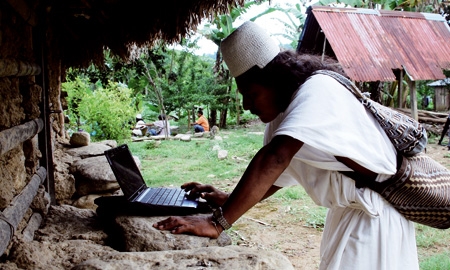As he sets to campaign for reelection at the May 2014 presidential poll, President Juan Manuel Santos and his team can be assured few will dispute the progress achieved during his first mandate in the all important area of information and communications technology (ICT). Indeed, in a paper he presented at the World Economic Forum of Davos last year, Minister of ICT Diego Molano Vega said his government has taken “critical steps toward increasing the country’s interconnectedness and fully developing a national digital ecosystem, which has great potential for generating wealth and socioeconomic development.”
International studies show there is a direct correlation between Internet penetration levels, ICT adoption, the generation of employment, and poverty reduction. A growing ICT industry creates new jobs in multiple industries and sectors.
“These jobs – unlike those in agriculture and manufacturing – are focused on new activities of the service sector,” says Mr. Molano Vega. “At the same time, the development of ICT increases Colombia’s competitiveness by allowing it to take advantage of opportunities in a market that is increasingly interconnected and that also generates local and global business opportunities.”
In order to grow the ICT sector, the Colombian government implemented the Plan Vive Digital (Live Digitally) for the period 2010-2014, which contemplates developing the whole “digital ecosystem” of Colombia – that is to say not only the infrastructure but also the customer base, applications and services.
 |  |
Juan Carlos Archila Cabal,
President of Claro | Esteban Iriarte,
President of Tigo
|
The objectives for 2014 were to triple the number of municipalities connected to the information highway and to connect 1,053 of the country’s municipalities to the national fiber-optic network; to connect to the Internet 50% of micro, small and medium-sized enterprises (MSMEs) and 50% of homes; and to increase the number of Internet connections fourfold, reaching 8.8 million Internet users by 2014.
Vive Digital has achieved just that. Since 2010, Colombia has gone from 2.2 million Internet connections to 7.8 million in 2013, with the 8.8 million connections objective set to be reached this year. While four years ago, only 200 municipalities were connected with optical fiber, 1,078 municipalities will be connected by the end of this year, representing 96% of the national territory.
Colombia has also massively invested to give access to computers to all categories of the population. Mr. Molano Vega himself is often seen distributing computers and tablets to farmers and schoolchildren around the country. Some 7 million children have benefited from the program ‘Computadores para Educar’ (Computers for Education), by which 577,000 computers have been installed in 13,500 education centers.
Another key development is the boom of cellular technology. As many users have more than one cell phone, the penetration rate is 105.3%, according to the Ministry of ICT.
The market is dominated by three operators:
Claro, which is the commercial brand of Mexico’s América Móvil, holding 61.5% of the Colombian market; Movistar, a subsidiary of Spain’s Telefónica, with 24.6%; and
Tigo, the commercial brand of Luxembourg-based operator Millicom International, with 13%. All three expect strong growth in the coming years.
“We have already grown significantly in terms of services and sales, with 6 million customers, 12,000 sales points and 150 direct customer care centers,” says Juan Carlos Archila Cabal, President of Claro. “Our territorial coverage is certainly one of our major assets, as we are the only service provider in many areas of the country.”
Claro is at the forefront of Colombia’s 4G drive, and was the first to launch the service in February, in Bogotá. The plan is to extend it to the rest of the country in phases during the coming months and years. “It is undeniable that cellular technology brings welfare to the people, especially in remote locations where we achieve a significant part of our growth,” adds Mr. Archila Cabal.
Esteban Iriarte, President of Tigo, also has high hopes for the development of the market. “Since the launch of Tigo in 2002, the value of our company has increased fivefold and we have generated more than 6,000 jobs,” he says. “We have doubled our market share, reaching 5.1 million customers, thanks in large part to our capacity for innovation and our strong, customer-oriented ethos. For instance we have launched a music platform with more than 25 million tracks available, which means customers could in theory listen to music without having to repeat any song for more than 195 years!”
Just like Claro’s President, Mr. Iriarte emphasizes that the ICT development in Colombia brings welfare to the people. “The growth of ICT translates into GDP growth: we contribute roughly 1.8% to the national GDP growth, which is significant.” Tigo’s parent company, Millicom International, recently announced its plan to double its size in the next five years, with ambitions to “grow very strongly not only in Colombia but also worldwide”.



0 COMMENTS